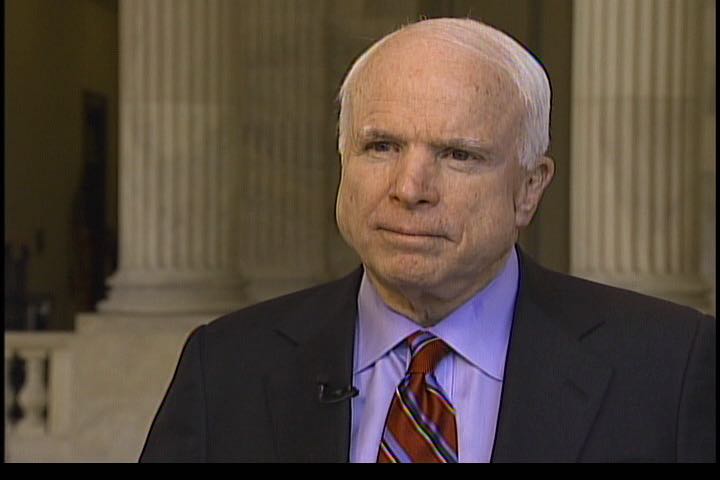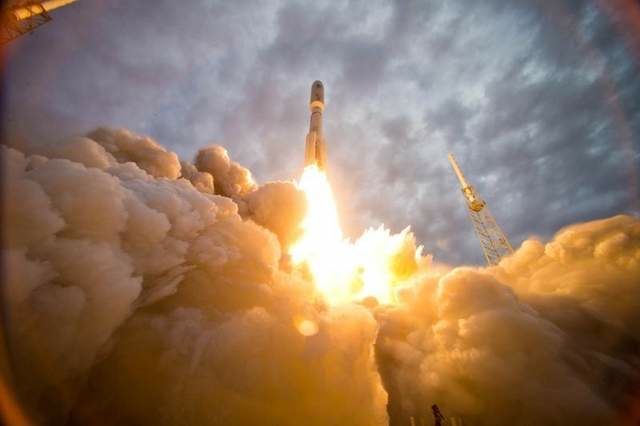McCain Warns Air Force On RD-180; Decries ‘Putin Cronies’ In Deal
By COLIN CLARKon April 30, 2015 at 4:29 AM

Sen. John McCain, R-Ariz., chairman of the Senate Armed Services Committee
CAPITOL HILL: Sen. John McCain came out swinging about the Russian RD-180 rocket engine during a Senate Armed Service strategic forces hearing.
McCain began yesterday by asking Air Force Secretary Deborah Lee James if she knew that a company called Amross was making millions of dollars of profits from the sale of the Russian rocket engines to the US. James clearly wasn’t sure what McCain was talking about. He plowed ahead, noting there was a story by Reuters several months ago about it. That pinged a memory for James. She told McCain she remembered the two stories and said she understood the departments of Commerce and Justice had cleared the Florida firm, formally known as RD Amross, of possible wrongdoing.

RD-180 engines powering an Atlas V
“It’s acceptable to have an outfit run by cronies of Vladimir Putin and a middle management that makes $80 million in markups?” McCain pressed her. “You think that’s acceptable to the American taxpayer, that we will be subsidizing an outfit that uses the cronies of Vladimir Putin (McCain said something else but I couldn’t hear him clearly).”
James offered a reasonable statement that she may well rue: “It’s regrettable, but the assured access to space is more important, in my opinion.” Assured access to space is a policy that the United States must be certain it can launch national security satellites into space when and where it needs to.
At that, McCain shook his head, saying, “Well, it’s not acceptable in my opinion and we will be doing something about it in the authorization bill.” He added that he thought this was a “disgraceful situation.”
McCain is a fierce opponent of Putin’s and tries at every turn to build support for more actions to support Ukraine in its war with the former KGB officer who now leads Russia. What McCain may have forgotten — or may not care about — is that the United States has spent more than a decade deciding not to build a replacement to the cheap, powerful and incredibly reliable Russian rocket engine.
Gen. John Hyten, head of Air Force Space Command, “We’ve needed to get off that engine for a decade and we haven’t done it.”
Ordering the space industry to build a replacement reliable enough to trust when we loft billion-dollar satellites into orbit in four years is a laudatory goal, but virtually everyone to whom I’ve spoken in the space industry and in the Air Force says it will be very difficult to do in that time.
In the meantime, the Air Force is asking Congress to change the law and allow the United Launch Alliance to use all 18 of the RD-180 engines it has ordered, not just the five for which it has has already paid, I’m not going to try and dissect just how many engines ULA needs because none of the experts to whom I spoke at the end of the hearing were sure of the number. Hyten told the subcommittee that using the full order of 18 RD-180 engines would assure that the US could launch through 2022.
Several senators, including Bill Nelson of Florida, who offered the initial language requiring the RD-180’s replacement, said they understood that building a new launch system was complex. They seemed receptive to Hyten’s comments that the Air Force was pretty sure it could deliver a replacement engine by 2019 but would probably another year or two to integrate that engine into a complete launch system. “We don’t just need an engine; we need a launch capability. For that launch capability we need a first stage engine, a second stage engine, a rocket for the first stage and the rocket for a second stage. And we have to make sure the first stage matches the second stage,” the general testified.
And they need two companies able to provide launch, in case anything should go wrong with one of the rockets. That will probably mean the US will rely on United Launch Alliance’s Vulcan rocket, which was unveiled at the Space Symposium earlier this month. and on Space X’s Falcon Heavy.
The subcommittee chairman, Sen. Jeff Sessions, put his finger on something near the end of the hearing when he told the Air Force leaders and his fellow senators that he understood the need for care. But he noted that, “Senator Mccain is a valuable leader because he always pushes us to reach a higher level.”
Perhaps America does need a sense of urgency on this front. Perhaps we have become complacent and reliant on the excellent Russian engines. But building a highly complex large rocket system is complicated. Ensuring it is at least as reliable as the RD-180 that powers the Atlas V may be too important to rush just to punish Putin in what would really be a symbolic manner that would not affect Russia in a material fashion. There’s also the wider space world to remember. The U.S. works very closely with Russia on a range of civil space issues, from getting astronauts to and from the International Space Station –which only Russia can do right now — and using the station itself. Those may also be goals worth adhering to.
The subcommittee headed off to the US Capitol to hold a classified session there. Nelson said he had a number of questions he wanted to raise.
McCain Warns Air Force On RD-180; Decries &[HASHTAG]#8216[/HASHTAG];Putin Cronies&[HASHTAG]#8217[/HASHTAG]; In Deal « Breaking Defense - Defense industry news, analysis and commentary
By COLIN CLARKon April 30, 2015 at 4:29 AM

Sen. John McCain, R-Ariz., chairman of the Senate Armed Services Committee
CAPITOL HILL: Sen. John McCain came out swinging about the Russian RD-180 rocket engine during a Senate Armed Service strategic forces hearing.
McCain began yesterday by asking Air Force Secretary Deborah Lee James if she knew that a company called Amross was making millions of dollars of profits from the sale of the Russian rocket engines to the US. James clearly wasn’t sure what McCain was talking about. He plowed ahead, noting there was a story by Reuters several months ago about it. That pinged a memory for James. She told McCain she remembered the two stories and said she understood the departments of Commerce and Justice had cleared the Florida firm, formally known as RD Amross, of possible wrongdoing.

RD-180 engines powering an Atlas V
“It’s acceptable to have an outfit run by cronies of Vladimir Putin and a middle management that makes $80 million in markups?” McCain pressed her. “You think that’s acceptable to the American taxpayer, that we will be subsidizing an outfit that uses the cronies of Vladimir Putin (McCain said something else but I couldn’t hear him clearly).”
James offered a reasonable statement that she may well rue: “It’s regrettable, but the assured access to space is more important, in my opinion.” Assured access to space is a policy that the United States must be certain it can launch national security satellites into space when and where it needs to.
At that, McCain shook his head, saying, “Well, it’s not acceptable in my opinion and we will be doing something about it in the authorization bill.” He added that he thought this was a “disgraceful situation.”
McCain is a fierce opponent of Putin’s and tries at every turn to build support for more actions to support Ukraine in its war with the former KGB officer who now leads Russia. What McCain may have forgotten — or may not care about — is that the United States has spent more than a decade deciding not to build a replacement to the cheap, powerful and incredibly reliable Russian rocket engine.
Gen. John Hyten, head of Air Force Space Command, “We’ve needed to get off that engine for a decade and we haven’t done it.”
Ordering the space industry to build a replacement reliable enough to trust when we loft billion-dollar satellites into orbit in four years is a laudatory goal, but virtually everyone to whom I’ve spoken in the space industry and in the Air Force says it will be very difficult to do in that time.
In the meantime, the Air Force is asking Congress to change the law and allow the United Launch Alliance to use all 18 of the RD-180 engines it has ordered, not just the five for which it has has already paid, I’m not going to try and dissect just how many engines ULA needs because none of the experts to whom I spoke at the end of the hearing were sure of the number. Hyten told the subcommittee that using the full order of 18 RD-180 engines would assure that the US could launch through 2022.
Several senators, including Bill Nelson of Florida, who offered the initial language requiring the RD-180’s replacement, said they understood that building a new launch system was complex. They seemed receptive to Hyten’s comments that the Air Force was pretty sure it could deliver a replacement engine by 2019 but would probably another year or two to integrate that engine into a complete launch system. “We don’t just need an engine; we need a launch capability. For that launch capability we need a first stage engine, a second stage engine, a rocket for the first stage and the rocket for a second stage. And we have to make sure the first stage matches the second stage,” the general testified.
And they need two companies able to provide launch, in case anything should go wrong with one of the rockets. That will probably mean the US will rely on United Launch Alliance’s Vulcan rocket, which was unveiled at the Space Symposium earlier this month. and on Space X’s Falcon Heavy.
The subcommittee chairman, Sen. Jeff Sessions, put his finger on something near the end of the hearing when he told the Air Force leaders and his fellow senators that he understood the need for care. But he noted that, “Senator Mccain is a valuable leader because he always pushes us to reach a higher level.”
Perhaps America does need a sense of urgency on this front. Perhaps we have become complacent and reliant on the excellent Russian engines. But building a highly complex large rocket system is complicated. Ensuring it is at least as reliable as the RD-180 that powers the Atlas V may be too important to rush just to punish Putin in what would really be a symbolic manner that would not affect Russia in a material fashion. There’s also the wider space world to remember. The U.S. works very closely with Russia on a range of civil space issues, from getting astronauts to and from the International Space Station –which only Russia can do right now — and using the station itself. Those may also be goals worth adhering to.
The subcommittee headed off to the US Capitol to hold a classified session there. Nelson said he had a number of questions he wanted to raise.
McCain Warns Air Force On RD-180; Decries &[HASHTAG]#8216[/HASHTAG];Putin Cronies&[HASHTAG]#8217[/HASHTAG]; In Deal « Breaking Defense - Defense industry news, analysis and commentary
